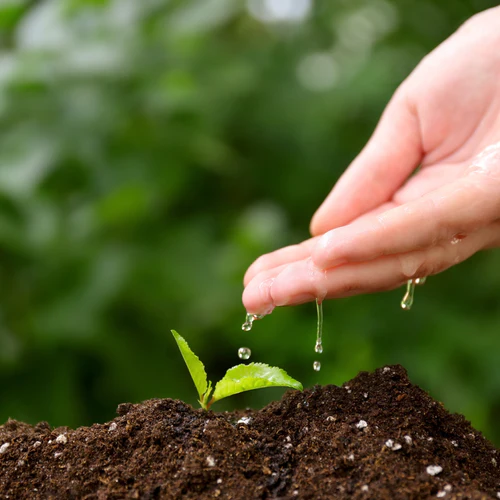Who knew Canada could get so hot!? With the summer we’ve been having, it’s hard to find the energy to get much work done. During times like these, you might find your garden is happy and healthy one minute and then droopy and sad the next! If the heats getting to you, and your garden, don’t worry! In this weeks blog, we’re here to help keep your garden hydrated and healthy during hot times.
Watering Times

When deciding the best watering times for your garden, you first want to start by checking with your local municipality. Each neighborhood is assigned a watering schedule to ensure adequate usage. These guidelines are crucial for keeping your water bill down and contribute to environmental initiatives for lowering our carbon footprint.
Morning: When possible, watering your plants in the early morning is always the best option for beating the summer heat. In the early morning, your plants can have more time to absorb the water through the soil before the sun comes to evaporate it. We recommend the earlier, the better, no later than 10 am.
Afternoon: In most places, the sun is at its peak around 12pm. To keep your plants hydrated during scorching summer temperatures, it’s crucial to never water your plants during peak sunshine hours. Watering your plants during these hours won’t allow your plants to absorb enough water before it gets evaporated. If the afternoon is the only time you have to water your plants, we recommend using a drip irrigation system to ensure a slow and steady watering solution to prevent water evaporation.
Evening: The best alternative to watering your plants in the morning is to water them in the evening! Watering your plants in the evening will allow them the proper time to absorb water from the soil up their roots before the sun comes up. When sticking to an evening watering routine, it’s essential not to overwater your plants, as this could cause fungal growth. Also, try not to water them too late into the evening. Giving them as much evening sun as possible will help to prevent water logging.
Watering Tools

Mulch: Mulching your garden beds is a great way to retain moisture by keeping your soil cooler for longer. Allowing your plants to absorb more water while also preserving water. Just apply 2-3 inches of mulch to the top layer of soil and water as needed. Be sure to reapply throughout the season.
Water bags/Rings: Water bags are a sustainable way to provide your trees with sufficient watering for 5 to 8 hours, never overwatering or underwatering your trees. If you plan on taking a summer vacation, water bags are the perfect solution to keeping your trees hydrated, especially for new trees that need to establish new solid roots.
Self-watering Stake: Whether your potted plants are outdoors or indoors, summer temperatures significantly affect container plants. Without a deep rooting system built into the earth, container plants can dry out quickly and die. While timing your watering will help, it may not be enough to keep your plants hydrated. For optimal hydration, self-watering stakes are the perfect solution for slowly releasing water for container plants. Giving you more time between watering while also stabilizing moisture levels.
Moisture & PH Meter: When you doubt whether your plants are being over-watered or under-watered, using a Moisture Meter will help you stay on track. After all, we don’t always get the same amount of sun each and every day. Simply stick the moisture meter in the soil to determine the amount of water required and water as needed.
Tips & Tricks

Depth: Water deeply & right at the roots. Soaker hoses with wand attachments work great! Watering deeply ensures you’re getting right to the roots. It’s better to water deeply, less frequently when possible. We also recommend watering right at the base of the plant. Not only is it a more effective way to hydrate your plants, but letting water sit on your plants’ leaves in the hot sun can cause damage and scorching.
Over-watering: Just because it’s toasty out there doesn’t mean your plants want to be drowned! Keep an eye on your soil. It should never be so wet that water is pooling, and you should allow some time to dry a little between watering so the roots can get oxygen.
Clay-rich soil: Depending on your plant’s needs, using clay-rich soil is a great way to retain moisture for longer. Good clay-rich soil can have better expanding properties, which will allow your soil to hold water longer and more evenly.
Slow release or drip: One of the most essential tips and tricks when it comes to keeping your plants hydrated is ensuring that they get the water you’re giving them! Often times we can be in a rush to water our plants, which can result in a runoff – meaning that the water has rolled off away from the plant. To ensure you’re watering right down to the root of your plants, we recommend using a drip irrigation system or slowing down and watering your plants evenly and all around the plant. This will also produce better-quality plants by preventing one-sided root growth.
For more tips and tricks on keeping your plants hydrated this summer, check out the latest episode of Get Up and Grow, with our President Gord Nickel Gardening Water Tips for Summer below!


